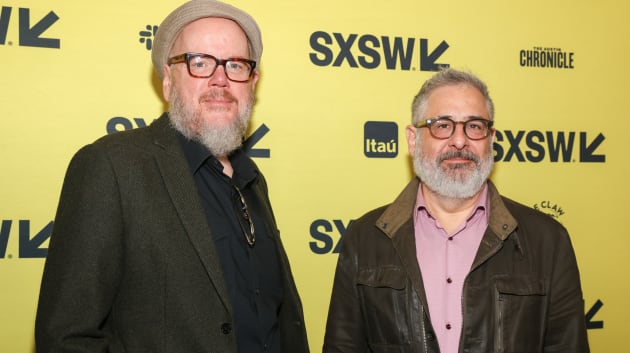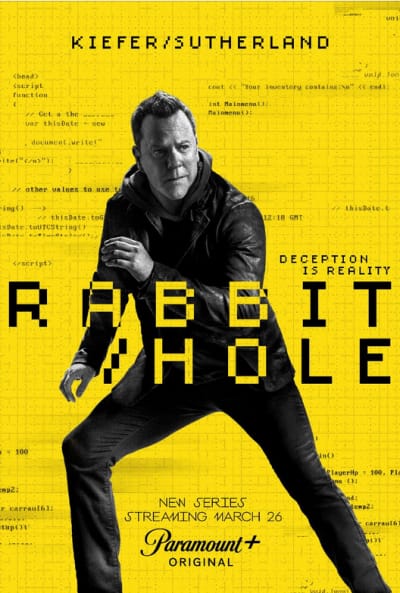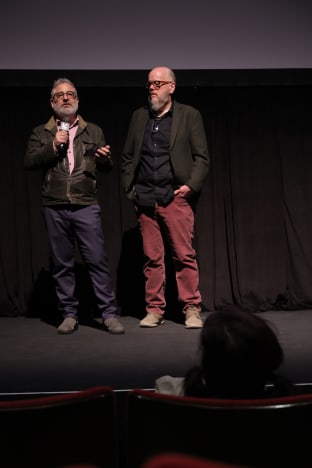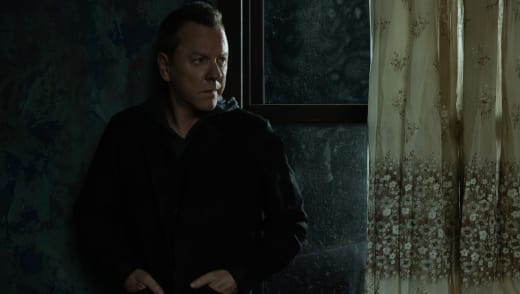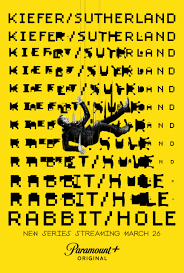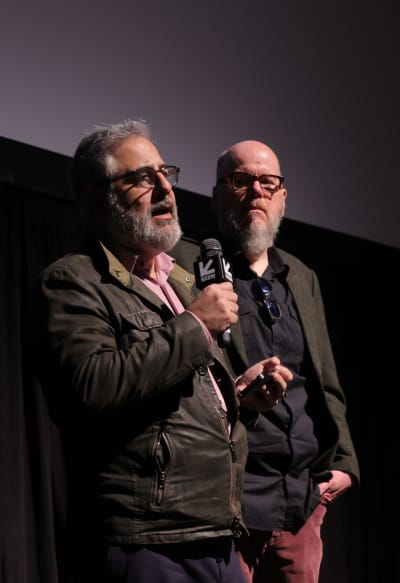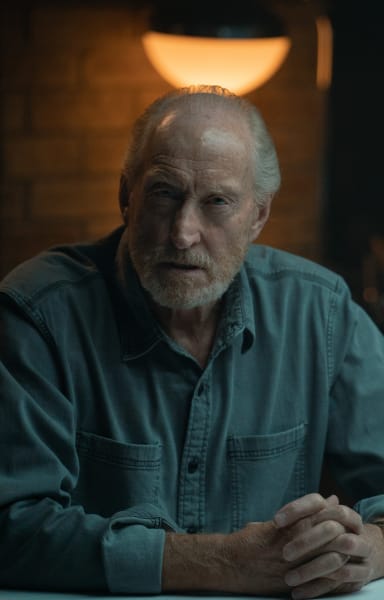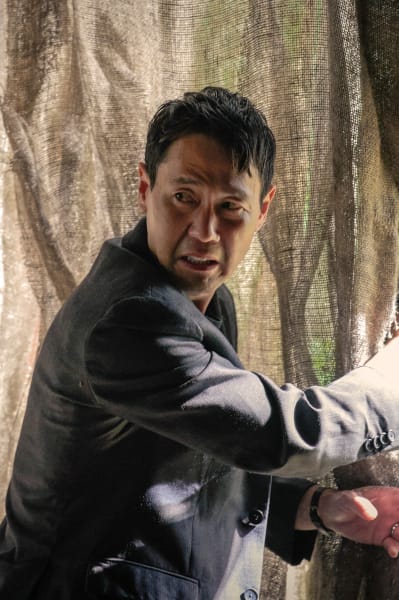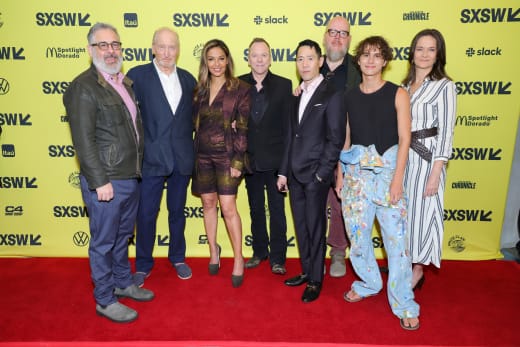When Rabbit Hole premieres on Paramount+ on Sunday, March 26, you have writing and producing partners Glenn Ficarra and John Requa to thank for it.
The series follows John Weir, “a master of deception in the world of corporate espionage framed for murder by powerful forces who have the ability to influence and control populations.” Read our full review here.
We had a chance to talk with them during a recent press day, and they offered insight into many things, including what inspired Rabbit Hole and why Kiefer Sutherland was always their John Weir.
You’ve been partners in this business for a long time. How long had you been toying with the idea of Rabbit Hole?
Glenn: Surprisingly, not long. Well, it was about two years ago, I guess. We got the first inklings of the idea and wrote it pretty quickly during the pandemic and sold it, and got it into production. It was all within a year, I guess.
And it came together pretty fast, which is odd for something so complicated. But I think the speed of it helped us because I think if we sat around and thought about it too much, we would’ve driven ourselves insane.
What was the inspiration for the show?
John: Seventies espionage thrillers, Three Days of the Condor, The Parallax View, The Conversation, and then also David Fincher’s The Game.
We just felt like those movies have such entertainment value, and it’s a great world to put characters in and have them try to have relationships and figure out their lives. And this world turned on its head. Yeah. That was their inspiration.
Technology is advancing all the time, so we don’t always know what we think we know. And I love how you used that and people’s love for conspiracy theories as a part of this story. How did all of that come together?
Glenn: Well, I think we were just so surrounded by conspiracy theories the past few years, and they’re just coming out of the woodwork. That was the thing that inspired us to explain how they happen and that maybe some of them are true and some of them aren’t. And I think I forgot the question, but it was a very big influence.
And you said that you conceived Rabbit Hole with Kiefer Sutherland in Mind. Why was he your John Weir?
John: America loves him and trusts him. And we needed a lead in this show that America would go with. Because the story twists and turns so much, you want the audience to stay with you. And the audience will stay with Kiefer. They love him.
Also, he’s a great actor who really can play the levels. I think people are going to see a side of him they haven’t seen before. He really digs in on this part. And it’s really his character, his ability to do what he does in this effed-up world has had an effect on him psychologically. And so he has to deal with that. And it’s had an effect on his personal life.
And so there’s a relationship starting in this season as well, and he has to work that out amongst all this unbelievable pressure.
Conspiracy theories and espionage, of course, drive the story, but it seems like there’s a much deeper story that’s more personal to John Weir. How much of the story would you say is espionage, and how much is a personal story?
Glenn: Yeah. I think it’s both.
What are the layers of that?
Glenn: There’s a lot of things being serviced, but it’s a good half of the show is him dealing with his past and dealing with his problems.
He’s battling his demons at the same time. He’s trying to get answers at the same time. He’s trying to save the world. And he’s a guy who’s the smartest guy in the room. He’s ahead of you on a lot of stuff. But he’s also in an emotional place. He’s a guy who’s still trying to cope with the world. So we get multiple facets of him.
There are so many twists and turns in this story. I need to know what your writing process was to keep everything on the table with these slow reveals. It’s incredible. I’m really enjoying it.
John: Well, thank you. When we sold the show, we said. “we want to do eight, and we need an all-eight pickup. We don’t want to do a pilot.”
Normally, you’ll do a pilot one episode, and then they’ll watch that, and they’ll decide. Because we said, we need to write all eight scripts. We can’t write one script and then another because that’s why these shows have unsatisfying plot culminations, why they don’t satisfy the audience.
So we have to write all eight of them. And we did. We wrote all eight of them. And we did; we got that pickup. And that was how we did it. So we basically had all eight of them. And we had them on the Dry Erase Board, and we were able to move the Post-its around and make sure we were not making any mistakes.
But anytime any actor or director of photography wanted to change some small thing, it was like we had to put our heads together.
Glenn: It was always a meeting.
John: We had to keep track of it all. It was very difficult, but it was fun.
How big was your board?
John: Huge.
Glenn: Big.
I imagine that it was massive.
Glenn: Big, big, it was big — multiple ladders.
3D board.
Glenn: Yeah, it was big. [chuckles]
Similarly, then how did production work? Did you do this linearly? Did you do it by episode, by segment?
Glenn: Well, we did a combo platter because we directed the first three and the last one, and then we had four other directors, so we had to shoot it episodically. We really had to think ahead. We’re very well-planned, and we were all working around each other to shoot things.
We’d be shooting a scene, and then it’s the next director for the next episode could come in, and we go and get a cup of coffee, and they direct a scene for their episode because we’re always flashing back to things.
It was very complicated.
And do you think Rabbit Hole has legs to run for multiple seasons?
Glenn: That’s the hope.
John: Yeah, we do. We think the whole goal of this season is to introduce satisfying characters and a world that people like but not leave a big, giant cliffhanger. Give them a satisfying story that feels like a movie at the end, and then they want to continue on with these characters and see more stories.
Basically, this is the team. The way we see it is forming a team, and then the team would go on to further adventures. Because this is a ’70s genre-
Glenn: Paranoid thriller.
John: Paranoid thriller. But there are other genres in this paranoid thriller world. There’s the English version, and there are all these other ones, and we’re fans of all of them. We would love to be able to get in there and tinker with, I don’t know, John LeCarre and stuff like that.
Rabbit Hole premieres on Sunday, March 26, only on Paramount+.
Carissa Pavlica is the managing editor and a staff writer and critic for TV Fanatic. She’s a member of the Critic’s Choice Association, enjoys mentoring writers, conversing with cats, and passionately discussing the nuances of television and film with anyone who will listen. Follow her on Twitter and email her here at TV Fanatic.
